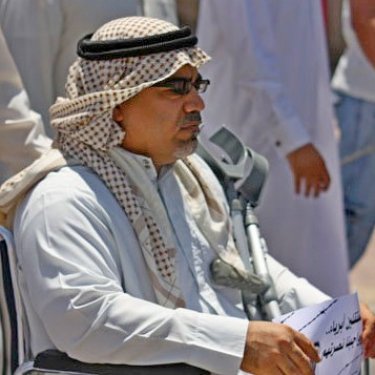Tenth anniversary of Bahraini blogger’s arrest

On the tenth anniversary of Bahraini blogger Abduljalil Al-Singace’s arrest, the first in a long series of arrests in response to the pro-democracy protests that had begun in Bahrain in February 2011, Reporters Without Borders (RSF) reiterates its call for his release and the release of all journalists arbitrarily detained in this Persian Gulf kingdom.
Al-Singace was arrested by dozens of police at his home in the capital, Manama, on 17 March 2011, after posting articles on his website Al-Faseelah in which he criticized the human rights situation in Bahrain, the persecution of the political opposition and discrimination against the country’s Shia Muslim community.
Because of his articles and his support for the peaceful pro-democracy protests in 2011, a military court sentenced him to life imprisonment in June 2011 – a sentence upheld by an appeal court in 2012 and the court of cassation in 2013.
Al-Singace’s health has worsened during these ten years in prison. Now aged 59, he has muscular problems resulting from a polio attack in his youth that have been compounded by torture following his arrest and medical neglect by the prison authorities who, for example, are slow to replace the rubber cushions on his crutches that relieve his shoulders and prevent him from falling. In 2015, he began a hunger strike that he continued for more than 300 days in protest against his prison conditions.
“We call for an end to Abduljalil Al-Singace’s detention, which has gone on for too long,” said Sabrina Bennoui, the head of RSF’s Middle East desk. “His health problems require special attention, and the authorities should free him for this reason alone, if no other. But his long jail sentence is extremely unjust, like the sentences passed on all the other journalists imprisoned in Bahrain.”
“Dr Al-Singace’s continued arrest and imprisonment is the highest practice of injustice and clear attack on freedom of expression in Bahrain," said on his part Dr Husain Abdulla, the Executive Director of Americans for Democracy & Human Rights in Bahrain (ADHRB). He also added that the recent European Parliament Resolution calling for human rights defenders to be freed should lead the French government, as one of the three countries with an Embassy in Bahrain, to “take a clear stand and demand publicly his release".
Al-Singace’s imprisonment marked the start of an unprecedented crackdown on Bahrain’s journalists. A first wave of arrests began in the wake of the massive protests of 2011, which had been covered by reporters. The most emblematic case is that of Hassan Mohammed Qambar, a photo-journalist who was sentenced to more than 100 years in prison for filming the 2011 protests.
A second wave began in 2015 amid growing criticism of the war in Yemen and Bahrain’s participation in the military coalition led by Saudi Arabia. The final, fatal blow to press freedom came with the closure of Bahrain’s last independent media outlet, the daily newspaper Al-Wasat, in June 2017. Its editor, Mahmoud Al-Jaziri, was arrested in October of that year and was sentenced to 15 years in prison.
Although Nabeel Rajab, a blogger who heads the Bahrain Centre for Human Rights, was released in June 2020, the situation for journalists is still extremely oppressive in Bahrain, with a total of 12 reporters currently detained. Since the start of the Covid-19 pandemic, the prison authorities have banned medical appointments and family visits.
Bahrain is ranked 169th out of 180 countries in RSF's 2020 World Press Freedom Index.



